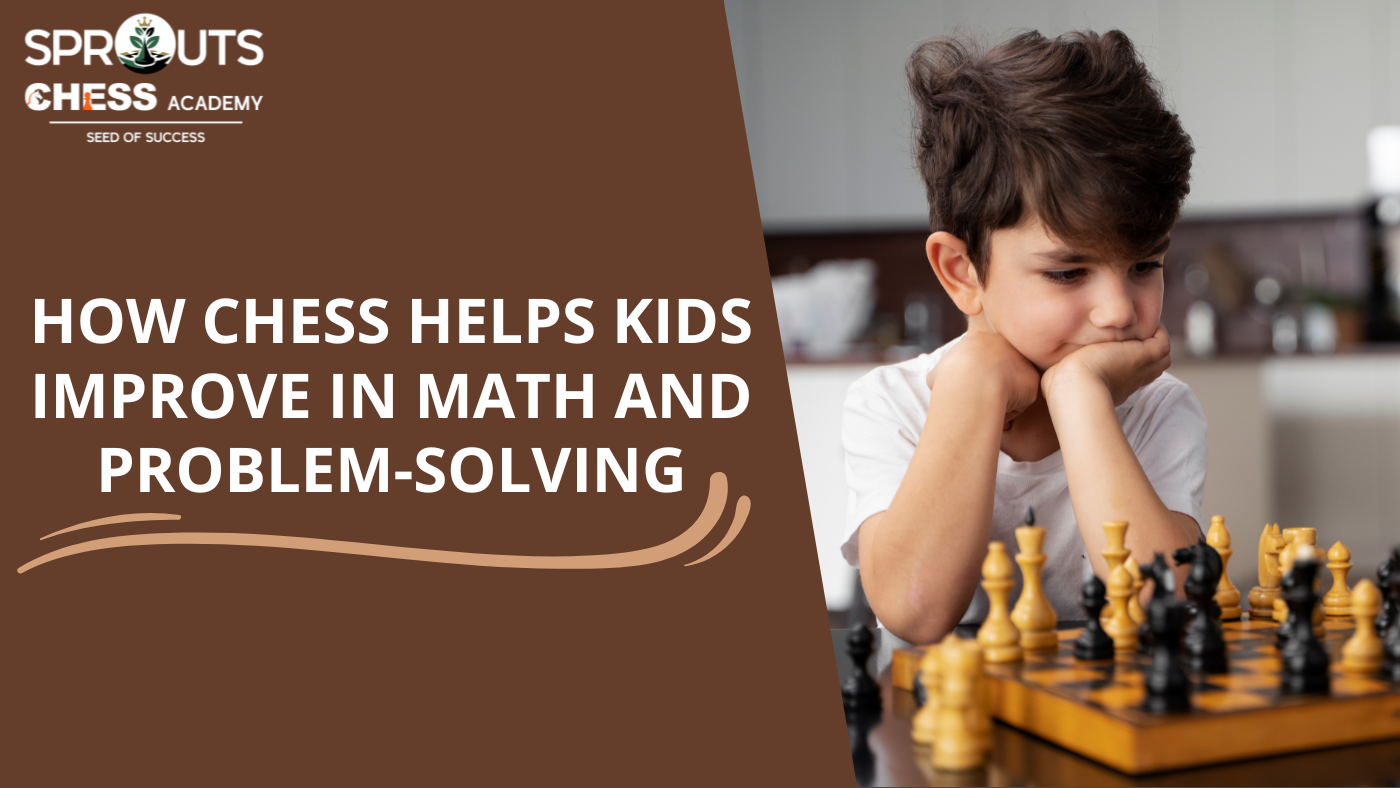
- Sprouts Chess Academy
- Mar 7, 2025
- Chess
- 0 Comments
Chess is a game that many of us enjoyed as kids, and it has a lot to offer for young minds. Beyond the fun and challenge, chess can sharpen a child’s skills in math and problem-solving. In this post, we explore why chess is a great tool for learning and offer actionable tips, examples, and takeaways for parents and educators.
Why Chess is Great for Kids
Chess is more than a board game—it’s a workout for the brain. Here are some key benefits:
- Builds Logical Thinking: Every move in chess requires planning and reason. Kids learn to assess situations and choose moves based on logic.
- Improves Planning Skills: Playing chess helps children learn how to think ahead and organize their thoughts.
- Enhances Concentration: A game of chess demands focus and careful attention to detail.
- Strengthens Memory: Remembering past games, moves, and strategies trains the brain to store and recall information.
- Develops Patience: Chess teaches kids to take their time, analyze options, and wait for the right moment to act.
These benefits help build a strong foundation for academic subjects, especially math and problem-solving.
How Chess Enhances Mathematical Skills
Chess and math share common ground in several ways. Let’s look at how the game can improve a child’s ability to handle numbers and calculations.
1. Improving Basic Calculations
In chess, every piece has a value. For example, a pawn might be worth 1 point, while a rook might count for 5. When kids learn to calculate these values, they practice basic arithmetic. This activity strengthens their addition and subtraction skills.
Key Takeaway: Regular practice of counting and comparing piece values can help kids become more comfortable with numbers.
2. Recognizing Patterns and Formulas
Chess is full of patterns—from how pieces move to recurring strategies on the board. Recognizing these patterns is similar to how kids learn formulas in math. When a child learns a specific opening move or tactic, they also learn to apply a set method to reach a goal.
Table: Common Chess Moves and Their Math Equivalents
| Chess Concept | Math Skill | Example in Practice |
|---|---|---|
| Piece values calculation | Addition/Subtraction | Adding up the points of captured pieces |
| Opening moves | Following formulas | Memorizing standard sequences in math problems |
| Recognizing board patterns | Pattern recognition | Identifying similar shapes or number patterns |
| Strategic planning | Logical reasoning | Solving multi-step math puzzles |
Key Takeaway: Just as kids learn formulas in math, they build routines in chess that help them think in steps.
3. Solving Chess Puzzles
Chess puzzles are designed to challenge a player’s ability to find the right move. Solving these puzzles can improve problem-solving skills by teaching kids to break a problem into smaller, manageable parts. This approach is similar to solving complex math problems by tackling one step at a time.
Bullet Points on Puzzle Benefits:
- Boosts Logical Reasoning: Each puzzle requires careful thought and planning.
- Encourages Trial and Error: Kids learn from each mistake and adjust their strategy.
- Builds Confidence: Solving puzzles gives a sense of achievement that carries over into other subjects.
Discover the Mastery of Chess
Join our FREE Demo Chess Classes and unlock your strategic potential. Perfect for beginners and aspiring chess players, these engaging sessions provide expert guidance and practical learning.
- ✔ Learn the rules and basics of chess
- ✔ Master opening strategies
- ✔ Sharpen your tactical thinking
- ✔ Compete in tournaments
Hurry! Limited seats available. Reserve your spot today.
Boosting Problem-Solving Abilities Through Chess
Chess is built on the idea of making decisions based on available information. Here’s how it hones a child’s ability to solve problems:
1. Analyzing Multiple Scenarios
In a chess game, kids must look ahead and consider what might happen if they make a certain move. This practice of evaluating different possibilities can transfer to solving math problems, where one must consider various methods to reach an answer.
Key Takeaway: By practicing chess, children learn to think about consequences before acting, a skill that is invaluable when tackling complex problems.
2. Breaking Down Challenges
Chess requires kids to break down the game into smaller tasks—such as protecting a piece, controlling the center of the board, or setting up a checkmate. This breakdown of challenges into clear steps mirrors the way math problems are solved.
Steps for Breaking Down a Chess Problem:
- Observe: Look at the current board setup.
- Plan: Consider your options and possible moves.
- Act: Choose the move that best fits your strategy.
- Review: After the move, reflect on what worked and what could improve.
Key Takeaway: This methodical approach teaches children the value of working through a problem step by step.
3. Learning From Mistakes
Every game of chess is a chance to learn. Kids review their moves after a game to understand where they went wrong and how they can improve. This practice builds resilience and a positive attitude towards mistakes, which is also beneficial in math.
Key Takeaway: Mistakes are seen as learning opportunities. This perspective helps children stay motivated and keep trying, even when a problem seems tough.
Developing Other Cognitive Skills Through Chess
Chess isn’t just about math and problem-solving. It also builds skills that support overall learning and personal growth.
1. Memory and Focus
- Memory Enhancement: Remembering past moves and strategies in chess directly supports memory skills needed for schoolwork.
- Improved Focus: The game’s demand for attention helps children develop the ability to concentrate on tasks, reducing distractions.
2. Spatial Reasoning
Spatial reasoning is the ability to visualize positions and movements. Chess teaches kids to see the board in their minds, which can help with geometry and understanding spatial relationships in math.
Example: When moving a bishop diagonally, a child practices visualizing the board and predicting how that move changes the overall layout.
3. Emotional Intelligence and Patience
Chess teaches kids to manage their emotions—whether it’s the frustration of a lost piece or the excitement of a successful tactic. Learning to stay calm under pressure can help them manage stress in school and daily life.
Key Takeaway: Emotional balance is a skill that benefits all areas of learning, including math and problem-solving.
Practical Tips for Parents
If you’re considering introducing chess to your child, here are some practical ideas to get started:
1. Start With the Basics
- Use Simple Chess Sets: Begin with a standard board and pieces to help kids get familiar with the game.
- Introduce the Moves Slowly: Teach each piece’s movement one at a time. You can use online tutorials or local classes.
- Practice Regularly: Consistent practice helps solidify the skills learned during play.
2. Engage in Fun Activities
- Solve Chess Puzzles Together: Make it a fun family activity to work on puzzles.
- Join a Chess Club: Look for local clubs or online communities where your child can play with peers.
- Celebrate Small Wins: Recognize progress, even in small steps, to keep your child motivated.
3. Use Digital Tools
There are many websites and apps that offer interactive chess lessons designed for kids. For example:
- Sprouts Chess Academy offers online and offline coaching for children.
- Global School of Chess provides strategies that can help kids recognize patterns.
- Chess.com is another resource that connects chess with math skills.
Table: Tips for Introducing Chess to Kids
| Tip | Description | Resource/Example |
|---|---|---|
| Start Small | Teach one piece at a time | Basic chess tutorials |
| Play Regularly | Consistent practice helps build skills | Daily chess puzzles |
| Use Fun Tools | Interactive apps and websites can enhance learning | Chess apps like ChessKid, Chess.com |
| Join a Community | Chess clubs offer social and competitive learning experiences | Local chess clubs or online communities |
Key Takeaway: A mix of physical and digital tools can make learning chess enjoyable and beneficial for your child’s growth.
Real-Life Examples and Case Studies
Many parents and educators have seen firsthand how chess can help kids with math and problem-solving. Here are a few examples:
- Case Study 1: At Kaabil Kids, instructors observed that children who engaged in regular chess practice improved their calculation skills and overall concentration in class. This helped them perform better in math assignments.
- Case Study 2: A group of students at the Global School of Chess showed increased confidence in tackling school projects after being introduced to strategic thinking through chess.
- Case Study 3: Research highlighted on Chess.com shows that children who practice chess regularly are more adept at identifying patterns and solving puzzles, which translates well into math tests.
These examples show that chess can be a fun, interactive way to boost academic performance in math and problem-solving.
Discover the Mastery of Chess
Join our FREE Demo Chess Classes and unlock your strategic potential. Perfect for beginners and aspiring chess players, these engaging sessions provide expert guidance and practical learning.
- ✔ Learn the rules and basics of chess
- ✔ Master opening strategies
- ✔ Sharpen your tactical thinking
- ✔ Compete in tournaments
Hurry! Limited seats available. Reserve your spot today.
Frequently Asked Questions
Q: At what age should my child start playing chess?
A: Many kids can start learning chess as early as 5 or 6 years old. The key is to keep the lessons fun and age-appropriate.
Q: How does chess improve math skills?
A: Chess helps children learn to calculate, recognize patterns, and plan ahead—skills that are directly useful in solving math problems.
Q: Can chess help with other subjects?
A: Yes. The concentration, memory, and problem-solving skills built through chess can benefit subjects like science, reading, and even art.
Q: Where can I find resources for teaching chess?
A: There are plenty of online resources such as ChessKid and local chess clubs. Educational blogs like those on Sprouts Chess Academy and Global School of Chess also offer useful tips.
Final Thoughts
Chess is a playful way to develop a range of skills that go beyond the board. From sharpening calculation abilities to boosting problem-solving and memory, the game offers a practical path to learning that supports schoolwork and personal growth. By integrating chess into your child’s routine, you help them learn to think clearly, solve problems step by step, and face challenges with confidence.
If you’re ready to see these benefits in action, consider exploring local chess clubs, signing up for an online class, or simply starting a family game night focused on chess. Each move on the board is a step toward building a stronger, more focused mind.




